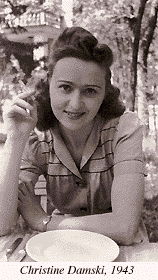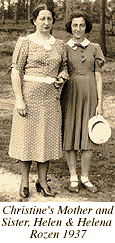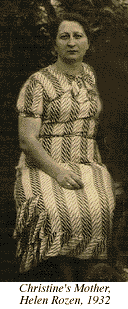CHRISTINE DAMSKI TELLS HER STORY (Continued)
 CHRISTINE DAMSKI: In the spring I got a letter from my mother in Zamosc, saying that they were beginning to liquidate the Jews in Zamosc; she wanted to come out.
CHRISTINE DAMSKI: In the spring I got a letter from my mother in Zamosc, saying that they were beginning to liquidate the Jews in Zamosc; she wanted to come out.
Johnny had gone to Warsaw to help my mother get Polish papers. When he returned to Zamosc he discovered that the cab driver who had brought him and my mother to the railroad station, was blackmailing his brother Zygmunt. Unless Zygmunt paid him, the cabdriver would turn Johnny over to the Germans, for helping a Jew. Johnny told him to go to hell, and refused to pay. But he couldn't go back to Zamosc now. He gave up his job, and moved to Czestochowa. We told everyone we were married.
My mother was close to us in Olsztyn, but my father stayed on in Zamosc with my sister. Johnny offered to help her get Polish papers too, but she said no. She and my father thought they were safe; she was young--only sixteen years old--and was working for my father's brewery business,
 which the Germans considered essential. My father went to work all day long, coming home only at night; there was no reason for him to run away. Besides, it was dangerous to live on Polish papers, especially for a man. If the police asked him to pull down his pants, they would know immediately he was a Jew. And if you didn't have the best looks? Polish people recognized Jews.
which the Germans considered essential. My father went to work all day long, coming home only at night; there was no reason for him to run away. Besides, it was dangerous to live on Polish papers, especially for a man. If the police asked him to pull down his pants, they would know immediately he was a Jew. And if you didn't have the best looks? Polish people recognized Jews.
Everything was going well for us in Czestochowa until we had a warning from the apartment janitor that somebody from Zamosc had recognized me. We immediately packed up for Olstyn, to be with my mother.
The farmer's family she was living with rented us their one room. The five family members slept in the kitchen, by the stove; they were that poor. My mother had settled in and become quite friendly with the farmer's wife; she was even going to church everyday. The wife was expecting a baby. They had one cow--their main livelihood--and the cow was pregnant too. The wife said if the cow gave birth first, they would be able to afford a nice party when her child was born, and my mother would be the godmother. This prospect scared my mother--she was afraid of the attention it would bring to her.
Every day the wife went to the forest to gather firewood to sell in Czestochowa. One day she came back, carrying the wood on her back, but now there was a baby in her shawl as well.
 She had delivered the child by herself in the woods. The cow didn't have its calf yet, so my mother was saved.
She had delivered the child by herself in the woods. The cow didn't have its calf yet, so my mother was saved.
Even in Olstyn the rumors started again; we knew we had to find a safer place for my mother. Oddly enough the only safe place seemed to be in Germany. The Germans had employment offices in nearly every town in Poland, to recruit volunteers for work on German farms, in factories, and businesses. Nearly the entire German population had been drafted into the military, and they badly needed a workforce. It was so hard for a poor person to make a living in Poland, a lot of Polish people were volunteering. In Germany they would at least have a place to live, food, and a little money.
I took my mother to register her at the Czestochowa recruitment office. She was wearing a babushka, looking very much like a peasant woman. But I didn't stop to think: I was dressed elegantly, in silk. This guy in the office looked at me, looked at my mother, then at me again. He walked to the front of the office, and looked up and down the street. He was suspicious. Then he came back, and said, "Okay. Come tomorrow for the physical examination." We didn't know what to do with ourselves for the rest of the day. We went to the biggest church in Czestochowa, the holiest church in Poland, where they held masses every hour, all day long. We moved from one part of the church to another until the evening curfew. The next day we went back and finished the registration; my mother signed up to go to Bavaria, to work in a family restaurant in the German Alps.
Return to:
 which the Germans considered essential. My father went to work all day long, coming home only at night; there was no reason for him to run away. Besides, it was dangerous to live on Polish papers, especially for a man. If the police asked him to pull down his pants, they would know immediately he was a Jew. And if you didn't have the best looks? Polish people recognized Jews.
which the Germans considered essential. My father went to work all day long, coming home only at night; there was no reason for him to run away. Besides, it was dangerous to live on Polish papers, especially for a man. If the police asked him to pull down his pants, they would know immediately he was a Jew. And if you didn't have the best looks? Polish people recognized Jews.
 CHRISTINE DAMSKI: In the spring I got a letter from my mother in Zamosc, saying that they were beginning to liquidate the Jews in Zamosc; she wanted to come out.
CHRISTINE DAMSKI: In the spring I got a letter from my mother in Zamosc, saying that they were beginning to liquidate the Jews in Zamosc; she wanted to come out.
 She had delivered the child by herself in the woods. The cow didn't have its calf yet, so my mother was saved.
She had delivered the child by herself in the woods. The cow didn't have its calf yet, so my mother was saved.